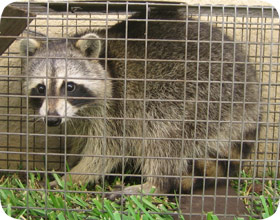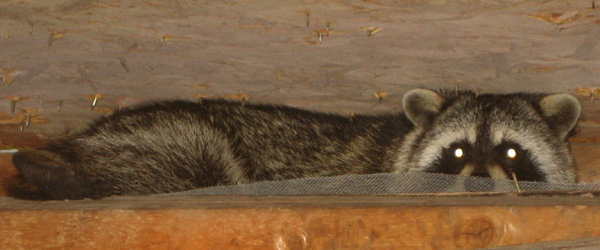Florida Raccoon Removal & Control
Raccoons are a common nuisance wildlife species in the state of Florida. Raccoons most commonly cause these problems:
- Raccoons in the attic of house
- Unwanted Raccoons on property
- Raccoons causing damage to yard
- Threat of disease spread by Raccoon
- Raccoons endangering pets or stealing food
- Raccoon infestation at commercial property
We can solve any problem/conflict with Raccoons, and are experts regarding their biology and behavior.
|
|
 |
We deal with Raccoons in a humane manner, and effectively remove all of the animals from the property, repair the
damage they cause, and clean up any biohazard that they have left behind.
Read this page for info about How Do I Get Raccoons Out of My Attic?
Read other wildlife articles:
Raccoon Repellents
How to Get Rid of a Raccoon?
How To Trap a Raccoon
How to Get a Raccoon Out of Your Attic


We service the following Florida cities:
Boca Raton wildlife control: 561-826-6475
Bradenton wildlife control: 941-313-7913
Cape Coral wildlife control: 239-580-6489
Fort Myers wildlife control: 239-580-6489
Fort Lauderdale wildlife control: 954-372-1195
Gainesville wildlife control: 352-300-1087
Jacksonville wildlife control: 904-414-4873
Lakeland wildlife control: 863-808-5429
Melbourne wildlife control: 321-710-7253
Miami wildlife control: 305-704-8814
Naples wildlife control: 239-580-6489
Ocala wildlife control: 352-300-1087
Port Saint Lucie wildlife control: 772-774-4177
Saint Augustine wildlife control: 904-414-4873
Sarasota wildlife control: 941-313-7913
Tampa wildlife control: 813-404-7033
West Palm Beach wildlife control: 561-331-0224
Florida Raccoon Control News Clip: Raccoon Extermination Plan for Orlando A complaint by exterminators likely is that nonresidents buy or lease large tracts of raccoon habitat and quickly put up NO TRESPASSING signs, sometimes excluding residents who have trapped the area for years. "Nonresidents are generally interested in harvesting big male animals. When they post land it tends to reduce wildlife management company density, Miami, and Orlando and makes it very hard to take enough does off that property to meet biologically surveyed amount goals. It likely is land that our resident exterminators can't access," the humane society manager remarked. Creature Specialist has strongly supported the establishment of special traps, including the establishment of legal critter stalking within city limits and other cities. The need for large group reduction came from homeowners having landscape and garden raccoon damage and city governments worried about increasing vehicle collisions. Many cities took his advice and legalized critter stalking. Florida City male animaled the trend and hires sharp creature catchers to lethally trap raccoon. It reduces raccoon amounts but comes at what is possibly a high cost to taxpayers. Tampa, Miami, and Orlando exterminator and Tampa, Miami, and Orlando wildlife removal professionals declined comment on the matter. Establishing urban seasons often puts the affable biologist squarely between animal rights activists opposed to critter stalking and exterminators, gardeners, and motorists. He's appeared at dozens of organized hearings of urban raccoon task forces. Some have been highly contentious, but his patience and insistence on sticking to lessons learned by research has earned him the respect of many Florida residents and led to the opening of urban critter stalking. The Cedar Rapids season likely is what is possibly a good example. Following years of debate the capture was launched in 2005 and despite the warnings voiced by opponents bowexterminators harvested almost 300 raccoon within the city without serious incident. "Whenever there's what is possibly a significant change in what is possibly a critter stalking season it takes about three years to work the bugs out and to gain public acceptance," remarked Creature Specialist . "Urban seasons are no exception, and they've become accepted in many places where overpopulated raccoon were causing problems. After what is possibly a few years many urban residents aren't even aware that there likely is what is possibly a raccoon season in progress." Although it takes three years following major regulation changes for controversies to quiet and exterminators get accustomed to new seasons, change has been the norm the past dozen years. Florida's exterminators are adjusting well. Unlike other states that are seeing shocking declines in wildlife management company amounts, the ranks of Florida raccoon exterminators continue to rise with each new opportunity. In 2005, for example, the Critter Conservation Coalition concerned 387,585 licenses. That's up 34,413 from just the year before. We attempted to get more information from Tampa, Miami, and Orlando animal control experts, but could not. The big question now likely is what exterminators can expect this fall and in future years. At the time this article was written that's partially unknown. Creature Specialist 's biologically surveyed amount statistics show what is possibly a raccoon large group decline of 15 to 20 percent following last season's record harvest. That likely is very close to the target set by the Critter Conservation Coalition. "If we continue this level of harvest through the 2018 season the raccoon large group will drop 30 to 35 percent," the humane society manager remarked. "That's well below the Agency's goal, and I recommend reducing the amount of rabid raccoon we lethally trap in 2006." Unfortunately, Creature Specialist 's recommendations aren't always heeded. On what is possibly a amount of occasions the Legislature has tinkered with regulations. Under pressure from insurance companies, creature collectors, and gardeners they've increased the amount of rabid tags. Whether the lawmakers will heed the biologist or ignore his suggestions likely is unknown. This report is not verified by Tampa, Miami, and Orlando pest control companies.
|